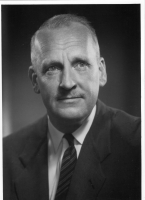
Year Born: 1910
Year Died: 1990
Year of Induction: 2007
Pioneer – Member of CAB Hall of Fame
Purdy, Rai (1910-1990)
Rai Purdy was a true pioneer in Canadian Broadcasting. Born Horatio John Purdy in England in November 1910, he moved to Toronto with his family when he was only three. He never finished high school, because the advent of the Depression meant he had to do his bit to pay his way, which he did by becoming a bicycle messenger. At the same time, he was already demonstrating embryonic skills as an entertainer, performing songs and comedy sketches at banquets or church concerts for a few bucks a show.
In 1929, he was accepted into the Hart House Theatre Company at the University of Toronto, where he studied with Maud Hope and Dora Mavor Moore, and appeared frequently in Ontario Drama Festivals, often in leading roles. One of the Hart House directors was Edgar Stone, who shared with Horatio his special interest in early radio technology, and it was Stone who in 1931 got Horatio a successful audition with Harry Sedgwick at CFRB radio in Toronto. At Harry’s request, the name Horatio was dropped, and Rai Purdy was born. He was also asked to tone down his English accent.
At CFRB Rai went on to head the drama department, and helped set up the music library. He was a pioneer of Canadian quiz programs, and established the first coast-to-coast radio playhouse, Canadian Theatre of the Air, and a humorous weekly serial, Penny’s Diary. Out of the Night was a weekly chiller-thriller with Rai playing leading roles. During this period he directed programs with Canadian talent who would also continue their careers into television, including Lorne Greene, Monty Hall, Robert Farnon and Andrew Allan.
On the lighter side, he and comedian Alan Savage launched a lunchtime radio series called Treasure Trail, which was played before a live audience, lasted for several years and was a great favourite with CFRB listeners. He left the station in 1939 to produce programs independently for CFRB and others.
In 1941, the Canadian Army recruited Rai into their ranks as a highly desirable member of their army broadcast unit, which he joined with the rank of lieutenant in 1942 He produced a weekly radio show for CBC, and then directed the Canadian army stage shows, which played at camps all across the Dominion. In late 1943, Rai went overseas with the Canadian Army Show, to entertain the troops in England. Later, after the successful invasion of the Continent had taken place, the Army Show units played all across Holland, France, Belgium Italy and Germany as the war was coming to an end, and for several months afterward. Included in the casts were such names as Wayne & Shuster, Jimmy Shields, Peter Mews, Denny Vaughan and Robert Farnon.
On returning to Toronto after the war, Rai got back into producing for radio, as well as producing stage productions for conventions. In 1950 he went to New York where he was hired by the CBS-TV network as director-producer, making a smooth transition to this exciting new medium. During his seven years there, he produced and directed The Robert Q. Lewis Show, The Stork Club Show, Double or Nothing with Bert Parks, The Morning Show with Dick Van Dyke and Merv Griffin, and Celebrity Time. He also specialized in the production of commercials and remotes. In a program entitled Around The Town, hosted by Mike Wallace, he took the first television cameras up the Empire State Building and the Statue of Liberty. During his time at CBS he met producers Jack Barry and Dan Enright, a meeting which to prove fortuitous on his eventual return to Canada.
In 1957, Roy Thompson invited him to help to put Scottish Television on the air in Glasgow, by heading up the programming department. Joining the company at its inception, he remained there for close to three years. But by 1959, Scottish Television was beginning to introduce the same cutbacks as were the other new UK ITV contractors, and it was time for Rai to move on.
In late 1959, Rai was loaned to John Bassett’s group by Roy Thompson, to work on the license application being made by the Telegram group for a Toronto TV license, which was to eventually to make CFTO the biggest private English language television station in Canada, and ultimately the owner of the CTV Network. He remained with CFTO as director of programs until they went on the air in January of 1961.
Rai then resigned to open his own production office in Vancouver. The name Rai Purdy Productions was a revival of the production business which Rai had run in Toronto. For the CTV Network, in association with Jack Barry and Dan Enright of Screen Gems, he conceived, produced and directed People in Conflict (13 yrs.), and Magistrate’s Court (8 yrs.), both daily programs. These shows were produced at CHAN-TV Vancouver, but Screen Gems moved the productions to CFCF Montreal in the mid-1960s to take advantage of their new colour cameras. Rai also produced and directed the James Beard cooking show.
Later, Rai was commissioned by CTV to produce and direct a one-hour documentary, The Taming of the Canadian West. For 12 years he also produced and directed the grandstand productions for Vancouver’s annual PNE celebrations. For some 20 years he was known as ‘Mr. Telethon’ , producing and directing over a hundred telethon programs for Variety Clubs, Lions Clubs, hospitals etc., and in the process raising over 250 million dollars for various causes across Canada.
Rai Purdy was inducted into the CAB Half Century Club in 1987.
He died in Vancouver, B.C. in May 1990.
In November 2007, Rai Purdy was posthumously inducted into the CAB Hall of Fame, and on May 17th 2016 he was elected a Pioneer Member of the British Columbia Entertainment Hall of Fame.
Written by Brian Purdy – March, 2006
